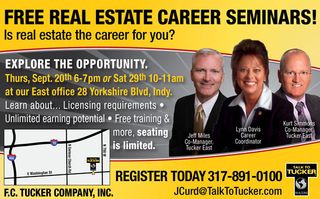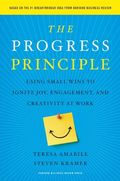One of the questions we often get from hiring managers is:
“Are one-on-one interviews really necessary in the real
estate hiring process?”
What’s implied in this question (and usually comes out later
in the discussion) is that it might be more efficient to conduct group
interviews with several candidates at once rather than one-on-one interviews.
The line of reason is that interviews take a lot of time,
and many early stage candidates are not serious about making a career
change. The group interview is a great
way to “weed-out” those who are not truly interested or unqualified.
 In a real estate company, this “group interview” usually
In a real estate company, this “group interview” usually
takes the form of a career seminar. It typically
is an informational meeting where the company describes the benefits of
changing careers and becoming a real estate agent. At the end of the meeting, there’s typically
some call to action (sign-up for licensing school, schedule a follow-up meeting
with a hiring manager, etc.) that encourages the candidate to move forward in
the process.
For years, we’ve recommended not using this methodology for
interfacing with the majority of candidates.
There is nothing wrong with running an occasional career seminar for
those who truly want information about a real estate career. However, using this tool as a replacement or
precursor to one-on-one interviews has not proven to be a best practice for
recruiting high quality individuals.
Outside of the empirical data that we collected on this
topic (ie. most real estate companies consistently hire 40% to 60% “D”
performers using traditional hiring techniques such as career seminars), I
could not put my finger on the psychology of why the “group interview concept”
was inferior until last week. I found this
insight in an odd place—a coaching article written by Ed Batista.
 I’ve read Ed Batista’s blog for several years, but I usually
I’ve read Ed Batista’s blog for several years, but I usually
gain insight from a coaching perspective, not a recruiting perspective. Ed is a successful executive coach and an
instructor and leadership coach at the Stanford Graduate School of Business. His business is coaching, but in the process
of explaining coaching concepts he reveals a lot about the psychology of
people.
The particular blog that peaked my interest was titled: Spending Attention. In this discussion, Ed makes the point that
focused attention is one of the most powerful forces made available to human
beings—both from a giving and receiving perspective.
“Focused attention is our most precious resource, because 1)
it's extremely taxing on our intellectual and emotional capabilities, 2) it can
have a amazingly powerful effect on its object, and 3) it can't be subdivided.
(We can pay continuous partial attention to multiple objects simultaneously,
but we can truly focus on only one object at any given moment.)Much of what I do as a coach and as an experiential educator
at Stanford involves nothing more than devoting my full attention to another
person. This is somewhat easier in a one-on-one coaching session with a client
or student, and it's somewhat harder in a group setting, but under any
circumstances it's a challenging task that's almost always worth the effort.”
So, what does this have to do with interviewing? There’s something powerful that happens to an individual when
they receive another person’s full attention.
Ed puts it this way:
“… devoting our full attention to someone can be a novel
experience for both of us that in and of itself stimulates something useful in
the interaction. The other person feels seen, heard, recognized, validated,
appreciated or challenged in ways that partial attention never generates. And
as we momentarily quiet our inner voice, we suddenly become aware of so many
things that we missed before–not only about the other person and our
environment, but also about ourselves. The subtler, more elusive thoughts and
feelings that are usually drowned out by the louder currents can now be heard.”
It’s obvious that humans crave focused attention. In the hiring process, the best chance of
making this happen is in a one-on-one interview.
By the way, just because a person is sitting across the desk
from you, doesn’t mean focused attention will happen (read the rest of Ed’s blog
to learn more about how you can become effective at giving focused attention).
But, focused attention is almost guaranteed NOT to happen in
a group interview/career seminar setting.
A high quality candidate wants and deserves the focused attention
of the hiring manager during the hiring process. If this element is missing, the high quality
candidates will exit the hiring process.
When the high quality candidates leave the hiring process,
all you’re left with are desperate candidates who believe they deserve no
better than a career information session.
Of course there are exceptions to this rule (I’m sure some
of you will write me about how you hired your best agent ever through a career
information session), but you won’t win the hiring game by betting on the
exceptions. In the long run, the time and
effort you put into one-on-one interviews will pay off.
Question: What techniques have you found effective in
making candidates feel they have your focused attention during an interview?
Join the WorkPuzzle Discussion at the Tidemark Online Community (TMOC)
Engage in the WorkPuzzle discussion by joining the TMOC private social network. Commenting on a public blog like WorkPuzzle can be a little intimidating, so why not join the discussion inside the privacy of the TMOC discussion group?
By joining TMOC, you'll get to see who else is in the group and your comments will only be seen by those whom you trust. Joining TMOC is quick, easy, and free (no kidding…this takes less than 2 minutes). To get started, click here.
Already of a member of TMOC? If so, join the WorkPuzzle Dialog Group by clicking on the WorkPuzzle Group icon on the left side of your TMOC homepage. Questions? Email the WorkPuzzle editor (workpuzzle@hiringcenter.net) and we'll walk through the process.
 Editor's Note: This article was written by Ben Hess. Ben is the Founding Partner and Managing Director of Tidemark, Inc. and a regular contributor to WorkPuzzle.
Editor's Note: This article was written by Ben Hess. Ben is the Founding Partner and Managing Director of Tidemark, Inc. and a regular contributor to WorkPuzzle.














